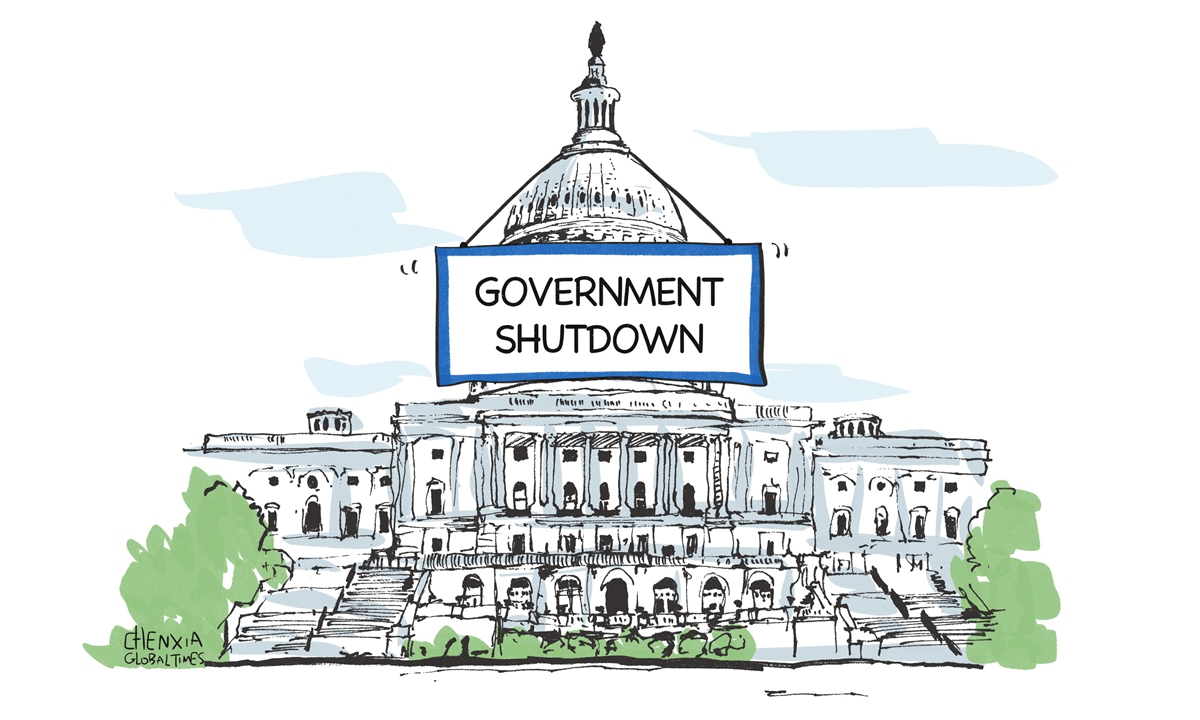US government shutdown: a prolonged ‘judo match’ with no winners

Illustration: Chen Xia/GT
The two-party system in the US now resembles a judo match where both sides grip tightly. The Democratic Party and the Republican Party are refusing to yield an inch. In such a struggle, the already fragile space for negotiation has all but vanished.
As of Sunday, the US federal government has been shut down for 11 days. On the surface, this looks like yet another routine budget impasse. However, a closer look reveals that this administration may call for a smaller government, using federal employees' livelihoods and infrastructure funding as bargaining chips.
This confrontation is fiercer - and more personal - than ever. Due to the shutdown, about 750,000 employees are currently foregoing their regular pay and more than 4,000 face confirmed layoffs. Behind these numbers are real families suddenly deprived of stability.
By using layoffs and funding freezes as weapons, the administration is putting pressure on Congress while showcasing a "no-compromise, zero-sum" governing style.
Economists estimate that each week of a federal government shutdown in the US can reduce the nation's GDP by approximately 0.1 percent to 0.2 percent.
Since 1976, the US federal government has experienced more than 20 shutdowns, each ending with a hastily struck short-term compromise after weighing various interests. But this time, things seem far from simple. In the past, after a government shutdown, there was often an unspoken agreement to avoid layoffs, leaving room for maneuver. In contrast, the current administration has not only publicly announced layoff plans but also put them front and center. This style of offensive introduces a new, irreversible variable into negotiations and has genuinely frightened many federal employees.
This marks a shift in the US two-party system from "tug-of-war competition" to "zero-sum confrontation." Once the livelihoods of millions of American families are wielded as weapons, who can guarantee that future partisan battles will not go even further?
The two-party system was originally designed as a check-and-balance mechanism, but under trends of polarization, this system is turning into a self-consuming closed loop. Multiple factors - including electoral districting, money-driven politics and the social media ecosystem - have accelerated the entrenchment of extreme positions in the US. The space for compromise that was once achievable through behind-the-scenes negotiations and rational exchanges has long disappeared, leaving zero-sum thinking to dominate most people's political imagination.
What is even more worrying is that government shutdowns themselves are gradually becoming normalized and morally desensitized. The ruthless targeting of career officials is tantamount to cutting off the federal system's self-repairing capacity. This not only undermines public trust in government services but also deepens social stratification and regional divides, weakening the US' overall governance capacity.
In this government shutdown drama, which has already lasted more than 10 days with no clear sign of resolution, what we see is not merely a procedural deadlock or budgetary disagreement, but a fundamental spread of institutional "internal friction." In the eyes of more and more Americans, the federal government is no longer a reliable lubricant for society; it has effectively become yet another political battleground.
In this "judo match," there are no winners - only a wounded nation and a divided society. Returning to normalcy will likely be even harder than we could imagine. If the political landscape in the US is this volatile, then any global forecast of future White House policies is inevitably accompanied by several large question marks.
Photos
Related Stories
Copyright © 2025 People's Daily Online. All Rights Reserved.









